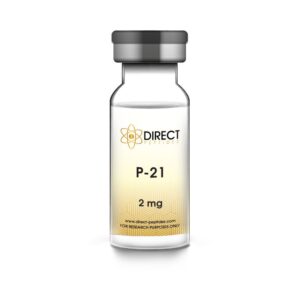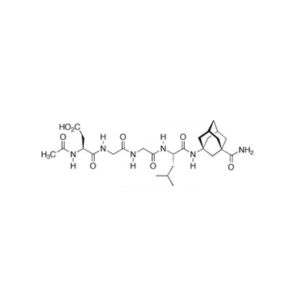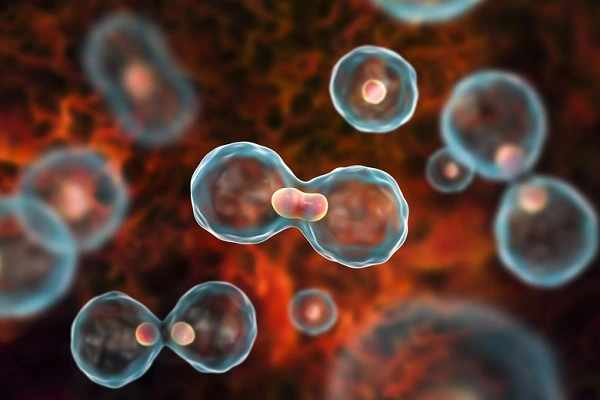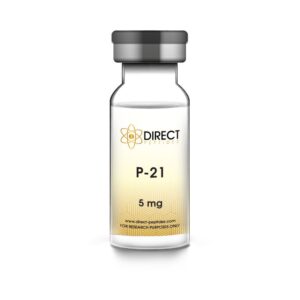Buy P-21 Peptide Lithuania
Buy P-21 peptide for research. It has shown potential benefits in promoting neurogenesis, enhancing cognitive function, and reducing neurodegeneration, making it a promising tool in neurological research and therapy.
Shop our Full Range of P-21 Peptides
-

P-21 Peptide Vial For Sale
£24.86 – £59.99Price range: £24.86 through £59.99 This product has multiple variants. The options may be chosen on the product page
What Is P-21 Peptide?
P-21 peptide is a neurotrophic synthetic peptide created for research, particularly in studying neurodegenerative disorders and cognitive function. It is made with a specific sequence of amino acids designed to support therapeutic potential.
Research suggests that the peptide is important for neurogenesis, cell growth, and cell cycle regulation—key factors in addressing neuronal damage and oxidative stress. Lithuania Animal studies using transgenic mouse models and lab experiments have investigated its potential in treating cognitive decline and related conditions.
Although more research is needed to fully understand how it works and its effectiveness, early findings show it may activate pathways involving molecules like BDNF and kinase, which are critical for neuron health and differentiation.
Potential research areas include inflammation, hippocampus repair, and tau protein regulation, which are linked to aging and early brain development. However, it’s important to note that P-21 is strictly for laboratory research and is not meant for human or animal use.
P-21 Mechanism Of Action
P-21 peptide supports neuronal health and regeneration by targeting key pathways. One of its main actions is modulating brain-derived neurotrophic factor (BDNF), a molecule essential for neuron survival and growth. It also affects kinase pathways, which are crucial for cell signaling, differentiation, and synaptic plasticity—key processes for repairing damaged neurons and promoting neurogenesis.
It has been shown to reduce oxidative stress and regulate inflammation, creating conditions that help with cell repair and growth. Additionally, its role in regulating tau protein offers potential for addressing tauopathies, conditions linked to cognitive decline and neurodegenerative diseases. These combined effects make P-21 an exciting area of research for improving neural function and repair.

Structure of P-21 Peptide
Sequence: Ac-DGGL-adamatanylglycine-NH2
Molecular Formula: C30H54N6O5
Molecular Weight: 578.3 g/mol
Synonym: P021
What Are The Research Benefits of P-21 Peptide
Enhances Neuronal Growth and Survival: The nootropic peptide modulates the expression of brain-derived neurotrophic factor (BDNF), which is essential for the support, survival, and growth of neurons in the brain. Lithuania Research suggests this helps promote neurogenesis (nerve growth) and inhibits the formation of Amyloid plaques and Tau proteins seen in Alzheimer’s disease [1].
Promotes Neurogenesis: Research in animal models shows by influencing critical kinase pathways related to cell signalling and differentiation, it encourages the development of new neurons, aiding in the brain’s regenerative processes [2].
Facilitates Synaptic Plasticity: The peptide plays a vital role in improving synaptic connections, which are crucial for memory formation, learning, and overall cognitive function [3].
Reduces Oxidative Stress: It helps mitigate oxidative damage within the brain, protecting neurons from stress-induced degeneration [4].
Regulates Inflammatory Responses: By managing inflammatory pathways, the peptide creates a favourable environment for neuronal repair and prevents further damage caused by chronic inflammation [3].
Supports Tau Protein Regulation: It contributes to the regulation of tau proteins, which is significant in addressing conditions like tauopathies that are associated with neurodegenerative diseases and cognitive decline [5].
Encourages Cellular Repair: Recent research indicates the peptide aids in cellular maintenance and repair, helping to restore function to damaged or impaired neurons [6].
Potential for Treating Neurodegenerative Diseases: Due to its multifaceted mechanisms, it shows promise in providing therapeutic benefits for conditions such as Alzheimer’s, Amyotrophic Lateral Sclerosis (ALS), Parkinson’s, and other disorders characterised by neural deterioration [7].
Improves Overall Neural Function: Through its diverse biochemical effects, it supports enhanced brain health and longevity, bringing hope for its application in mitigating neurological decline [8].
Buy P-21 Peptide Lithuania for in-vitro laboratory experimentation online today!
P-21 Peptide Quality Assured
Buy P-21 peptide with 99% purity from Direct Peptides, designed specifically for scientific research. Each product is third party tested to ensure high quality and reliability, giving researchers confidence in their results. Count on our peptides for safety, precision, and consistent support in advancing your research.
Summary of Research Applications
- Potential to reverse cognitive impairment [9].
- Improves cognitive performance.
- Helps boost levels of BDNF.
- Regulates inflammatory responses.
- Reduces oxidative stress.
- Improve cellular repair.
Buy P-21 Peptide Vial
Buy P-21 peptide vial Lithuania, available in 2 mg and 5 mg vials. This synthetic compound is designed for research on cognitive and neurological health. It mimics natural peptides to modulate inflammation, cellular repair, and protein regulation, making it valuable for studying neurodegenerative diseases like Alzheimer’s and Parkinson’s. Provided in sterile vials, it is strictly for research use and must be handled with care.
Frequently Asked Questions (FAQs) about P-21 Peptide
Is P-21 peptide safe to use?
It is strictly intended for research purposes and not for human or animal consumption. It should be handled by trained professionals in a controlled environment to ensure safety during experiments.
How should P-21 peptide be stored?
It should be stored in a cool, dry place away from direct sunlight. For extended storage, it is recommended to keep it in a freezer at a temperature of -20°C to maintain stability and potency.
What are the potential benefits of studying P-21 peptide?
Lithuania Research has shown its potential in areas such as promoting neural repair, reducing neuroinflammation, and improving overall brain function. These findings could contribute to advancements in therapies for neurodegenerative diseases.
Can P-21 peptide be used in medical treatments?
Use of this product is not approved for medical treatments. It is a research chemical and has not been licensed for therapeutic use in humans or animals. Its use is strictly limited to scientific research.
Are there any long-term side effects associated with P-21 peptide?
Due to its experimental status, the long-term side effects remain unknown. Studies have shown many neurogenic compounds can cause fatigue, suggesting P21 may also cause mild fatigue. Current Lithuania studies have primarily focused on short-term observations, which have reported relatively mild reactions such as injection site discomfort or minor headaches. However, thorough long-term clinical trials are essential to determine any potential risks or adverse effects that may emerge over extended periods of use.
How is P-21 peptide administered for research?
It is typically provided in sterile vials for controlled laboratory experiments. The method of administration varies based on the research design and objectives, but it must only be handled by qualified researchers.
Are P21 Peptide and P21 (CDKN1A) the same?
P21 Peptide and P21 (CDKN1A) are not the same. P21 Peptide is a short chain of amino acids that can be used in various research and medical applications, while P21 (CDKN1A) is a gene that encodes for a protein involved in cell cycle regulation and tumor suppression. Although they both share the term “P21,” they refer to different entities with distinct functions in biological processes.
Buy P-21 Peptide Lithuania from Direct Peptides.
References For Further Reading
[1] Bin Li, Lukas Wanka, Julie Blanchard, Fei Liu, et al (2010) Neurotrophic peptides incorporating adamantane improve learning and memory, promote neurogenesis and synaptic plasticity in mice – FEBS Letters, Volume 584, Issue 15, 4 August 2010, Pages 3359-3365.
[2] Francesco Chiani, Valentina Mastrorilli, Nicole Marchetti, Andrea Macioce, et al (2024) Essential role of p21Waf1/Cip1 in the modulation of post-traumatic hippocampal Neural Stem Cells response – Stem Cell Research & Therapy, 2024 Jul 6, Volume 15, Page 197.
[3] Dong Kong, Yossi Dagon, John N Campbell, Yikun Guo, et al (2016) A Postsynaptic AMPK→p21-Activated Kinase Pathway Drives Fasting-Induced Synaptic Plasticity in AgRP Neurons – Neuron, 2016 Jul 6, Volume 91 (Issue 1), Pages 25-33.
[4] Ansar Karimian, Yasin Ahmadi, and Bahman Yousefi (2016) Multiple functions of p21 in cell cycle, apoptosis and transcriptional regulation after DNA damage – DNA Repair, Volume 42, June 2016, Pages 63-71.
[5] Syed Faraz Kazim and Khalid Iqbal (2016) Neurotrophic factor small-molecule mimetics mediated neuroregeneration and synaptic repair: emerging therapeutic modality for Alzheimer’s disease – Molecular Neurodegeneration, volume 11, Article number: 50 (2016).
[6] André P Koth, Bruno R Oliveira, Gustavo M Parfitt, et al (2014) Participation of group I p21-activated kinases in neuroplasticity – Journal of Physiology, Paris, 2014 Sep-Dec, Volume 108 (Issue 4-6), Pages 270-7.
[7] A.R.Monteiro, M.Maia, and M.Martins (2023) P21-21: Insights into the neuroprotective effects of novel synthetic compounds as potential small molecules for the treatment of Alzheimer’s disease – Toxicology Letters, September 2023, Volume 384 (Issue 2), Pages S246-S247.
[8] Lixia Zhao, Qiu-Lan Ma, Frédéric Calon, Marni E Harris-White, et al (2006) Role of p21-activated kinase pathway defects in the cognitive deficits of Alzheimer disease – National Neuroscience, 2006 Feb, Volume 9 (Issue 2), Pages 234-42.
[9] Silvia Bolognin, Mario Buffelli, Jukka Puoliväli, and Khalid Iqbal (2014) Rescue of cognitive-aging by administration of a neurogenic and/or neurotrophic compound – Neurobiology Aging, 2014 Sep, Volume 35 (Issue 9), Pages 2134-46.
ALL CONTENT AND PRODUCT INFORMATION AVAILABLE ON THIS WEBSITE IS FOR EDUCATIONAL PURPOSES ONLY.
DISCLAIMER: These products are intended solely as a research chemical only. This classification allows for their use only for research development and laboratory studies. The information available on our Lithuania Direct Peptides website: https://direct-peptides.com is provided for educational purposes only. These products are not for human or animal use or consumption in any manner. Handling of these products should be limited to suitably qualified professionals. They are not to be classified as a drug, food, cosmetic, or medicinal product and must not be mislabelled or used as such.
Related Posts

P21 Nootropic Peptide:Can It Unlock Stress Relief & Brain Power?
The blog discusses P-21 Peptide's potential to combat the effects of chronic stress on the brain. Research suggests it may enhance brain resilience, protect against neural damage, regulate neurotransmitters, and stabilise cortisol levels, offering promise in stress management and cognitive support.

P-21's Peptide's Benefits In Wound Healing And Tissue Repair
The blog highlights the potential of P-21 Peptide in revolutionizing wound care and tissue repair with its benefits like faster healing, reduced scarring, and anti-inflammatory properties. Supported by scientific research, it positions the peptide as a promising advancement, surpassing traditional methods and addressing key challenges in global healthcare.

Peptide P21 Benefits In Cell Cycle Regulation & DNA Repair
Peptide P21 plays a key role in regulating the cell cycle by inhibiting CDKs, ensuring DNA repair before cell division to prevent mutations. Its potential spans cancer research, aging, and regenerative medicine, making it a promising tool for advancing therapies and preventing disease.

